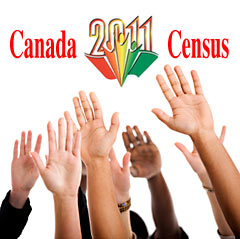The right call
By Catholic Register Editorial The world has come a long way since Mary and Joseph went to Bethlehem to be counted in King Herod’s census. In our technological age, information and statistics shape our everyday living. Our personal information is digitally stored and used by everybody from the taxman, health providers and bankers to government licensing agencies that keep track of everyone from drivers to fishermen to hot-dog vendors.
The world has come a long way since Mary and Joseph went to Bethlehem to be counted in King Herod’s census. In our technological age, information and statistics shape our everyday living. Our personal information is digitally stored and used by everybody from the taxman, health providers and bankers to government licensing agencies that keep track of everyone from drivers to fishermen to hot-dog vendors.There seems to be almost universal agreement that gathering detailed data is essential to a smooth-running society. But how far should governments go to collect a citizen’s personal information? That is the crux of a debate sparked by a federal announcement that Canadians will no longer face fines and possible jail time for refusing to complete the long-form version of the Statistics Canada census.
It is a controversial decision and it is the right one.
There is little disagreement about the need for a comprehensive national census. Modern societies require vast reservoirs of information in order to effectively plan and deliver a broad range of services, many of them essential. For the Church, these include developing strategies for education, new parishes and ministries that support the sick, elderly and poor.
The challenge is to collect data in a way that balances the greater good with individual rights. No one is demanding that the long form be scrapped, just managed differently. In the past, a mandatory long form went to 20 per cent of Canadian households. Starting in 2011, that will increase to 30 per cent but compliance is voluntary. So, where 2.7 million homes got the mandatory long form last time, about four million will now get a voluntary form. That means a response rate of 66 per cent is needed in 2011 to match 2006 results.
Advocates of a mandatory long form contend people will ignore a voluntary census but, in a twist of irony, they’ve offered no data to support that concern. They also voice the patronizing view that new Canadians and the poor, among groups who benefit most from census-generated programs, are least likely to heed a voluntary call to civic duty.
The response rate to a voluntary census is unknown, but it’s interesting that average voter turnout over the past five federal elections was 63 per cent. If that is a sign of civic engagement, it seems plausible for a voluntary census to elicit a 66 per cent response rate, particularly if bolstered by a smart promotional and educational campaign. And if there is a response shortfall, the census pool can be increased in subsequent years to maintain the integrity of the data.
It is up to government to explain why the long form census is vital. The Church, too, should articulate why it needs so much in-depth, personal data. Education is much preferred to threats of jail time. Most Canadians are reasonable. If the proposition is sound, it will be heeded.
Please support The Catholic Register
Unlike many media companies, The Catholic Register has never charged readers for access to the news and information on our website. We want to keep our award-winning journalism as widely available as possible. But we need your help.
For more than 125 years, The Register has been a trusted source of faith-based journalism. By making even a small donation you help ensure our future as an important voice in the Catholic Church. If you support the mission of Catholic journalism, please donate today. Thank you.
DONATE
